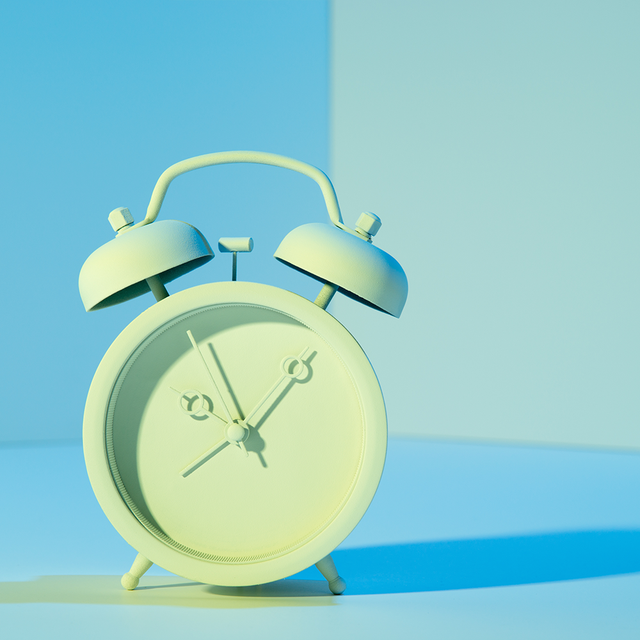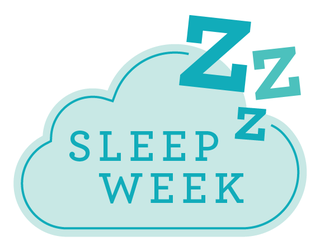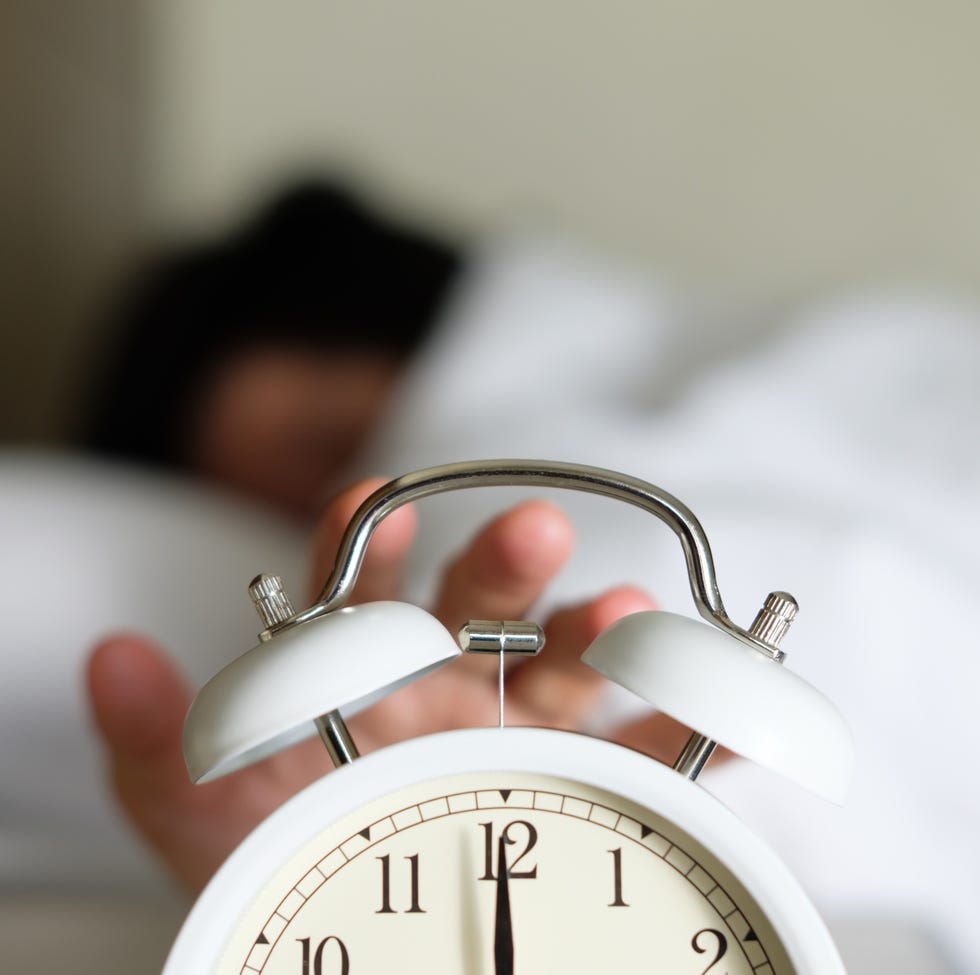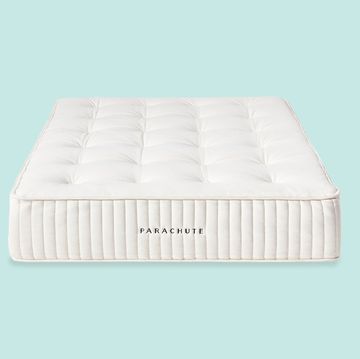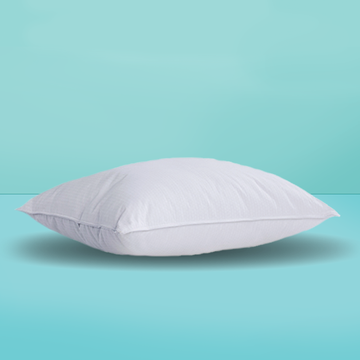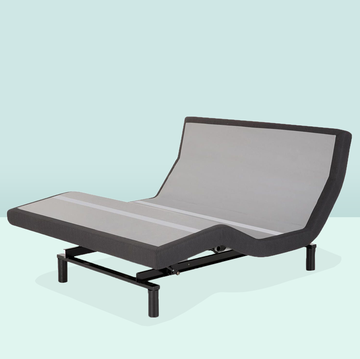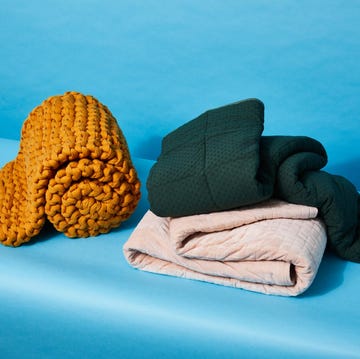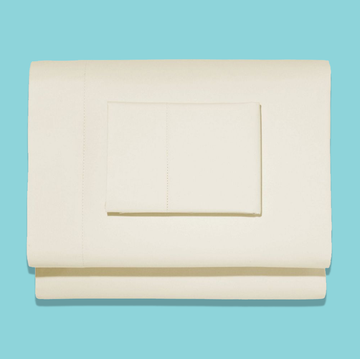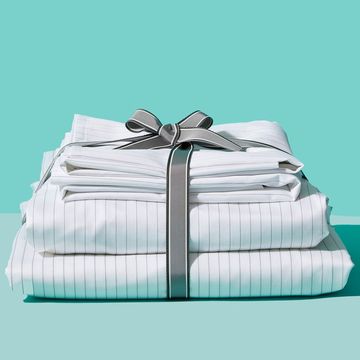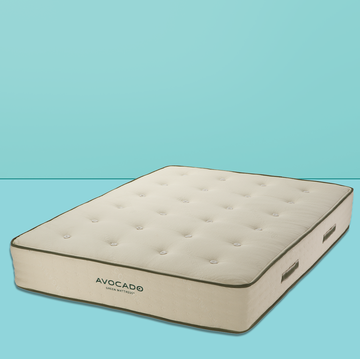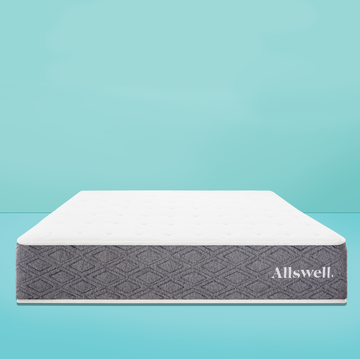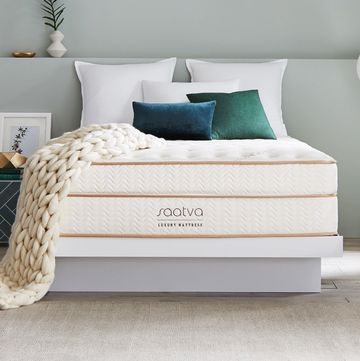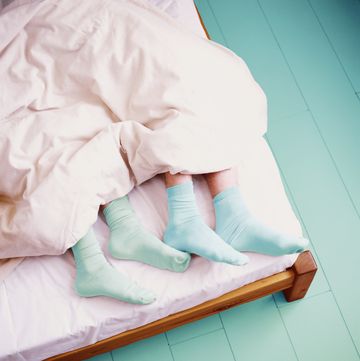If you're reading this on your phone while lying in bed wide awake, you're probably not the only one. Despite a wealth of information out there about how to catch more zzz's — from meditating before bed to avoiding screens — many of us are still staring at the ceiling far longer than we'd like. One in three American adults don’t get enough sleep, according to the Centers for Disease Control and Prevention.
And if you've got a cupboard full of failed sleep remedies, that's not totally your fault either. With so much information floating around, it's hard to separate fact from fiction. In a recent study published in Sleep Health, researchers looked at 8,000 websites to suss out some stereotypical myths about sleep. They found that many commonly held beliefs — like drinking a glass of wine before bed to help you snooze — are just plain wrong.
“The population generally knows a lot about nutrition and exercise, but there are some things about sleep that still persist, whether they’re old wives tales or things people just aren’t sure about,” says Rebecca Robbins, PhD, lead author of the study and a postdoctoral research fellow in the Department of Population Health at NYU Langone Health.
So how do you separate the miracles from the malarky? Here are 15 science-backed ways to start sleeping better, according to experts:
1. Establish a routine
Putting yourself to bed around the same time every night isn't just for kids. If you’ve ever felt the effects of jet lag, then you already know how just a few hours' difference can throw off your brain and your body. It can even lower the quality of the sleep you do get, as your brain struggles to figure out whether it's really bedtime.
“If sometimes your bedtime is at 10 p.m. and sometimes it’s 2 a.m., your body doesn’t know when it’s supposed to be asleep,” explains Ilene Rosen, MD, program director for the University of Pennsylvania Sleep Fellowship and the former president of the American Academy of Sleep Medicine. “It will go into a lighter stage of sleep.”
2. Skip the nightcap
“What we see in the literature is that people often consume alcohol before bedtime,” Robbins says. Unfortunately, that nightly glass of wine (or two) you sip to unwind after a long day isn’t doing you any favors in the sleep department.
“It may help you fall it asleep, but it ruins the quality of your sleep,” explains Robbins. Instead, try sipping a caffeine-free herbal tea — like lavender or chamomile — to get your body and brain in the mood to snooze.
3. Turn down the thermostat
Think “cave” when you’re setting up your bedroom for sleep, says Natalie Dautovich, Ph.D., environmental scholar for the National Sleep Foundation. She recommends keeping the bedroom dark, quiet, and cool to create the optimal environment for sleep. And when we say cool, we mean cool – around 68 degrees is prime.
To enhance the effect of cooling down your body for sleep, take a warm bath or shower to close out your day. "When you get out of the bath, the contrast to accelerate the body cooling mimics the sense that your body's cooling down as you're falling asleep," Dautovich explains. "That can help with the onset of sleep."
4. Avoid screens
Binge-watching your favorite mindless sitcom until you pass out can become a go-to routine, but the laptop, tablet, phone, or TV you’re using is counteracting your body’s natural sleepiness. These electronic devices emit short wavelength blue light, which can actually help your brain stay alert. “If you walk outside on a bright, sunny day, you’re instantly awake,” Dr. Robbins says. “Blue light is one of the triggers to our circadian rhythm, our biological clock for becoming awake.”
If you can, Dautovich recommends staying away from screens for an hour or two before bed, or using blue light-filtering glasses or apps on your phone if you just can't tear yourself away.
5. Use your bed only for sleep
Hanging out in bed — whether you’re reading books or even just lying there blinking — isn’t the best idea. “There’s a belief that if you stay in bed and toss and turn, you’ll at least get some sleep — that some is better than none,” Robbins says. “That is not ideal because our bed becomes a stressful place where you really want your bed to be a sanctuary.”
Instead, get out of the bed after about 15 minutes of trying to fall asleep, and do a quiet, boring activity in another room, like folding laundry. “This subconsciously tells the brain that it should be doing nothing else but sleep when the body is in the bed,” says Pradeep Bollu, M.D., a board-certified sleep specialist and neurologist with MU Health Care.
6. Don’t hit snooze
If you're one of those people with 10 alarms in the morning so you can snooze your way toward your day, we've got bad news for you. The study in Sleep Health indicated that snoozing doesn't actually result in more rest. “The sleep you’ll get subsequent to hitting the snooze button is very, very poor quality,” Robbins says.
7. Exercise (but listen to your body)
Besides lowering your chronic disease risk, reducing feelings of anxiety, and promoting a healthy weight, working out can also help you feel more rested. “Aerobic exercises promote sleep and improve the sleep quality,” says Bollu.
Adults should get at least 150 minutes of moderate aerobic activity or 75 minutes of vigorous aerobic activity a week, the U.S. Department of Health and Human Services advises. But if you're not into hitting the gym, keep in mind that everything from brisk walking to active yoga to yard work counts.
While some people can pass out right after a sweat sesh, Dautovich says the impact exercise has on a person's sleep depends on the individual. "For some people, exercise can be very stimulating. For other people, it can be relaxing," she explains. "If it's not disruptive to your sleep to do it later in the day, then it's fine and can be beneficial."
8. Nix naps
Many people think taking a short siesta will help them catch up on the sleep that they’re struggling to get at night, but it doesn't actually work that way. If you have a hard time falling asleep at night, give up on napping during the day, Rosen advises. Naps reduce the homeostatic sleep drive, which is the force that makes you feel tired at bedtime. If you just can’t keep your eyes open in the afternoon, set that alarm for no longer than 30 minutes so you don’t enter deeper stages of sleep, Bollu says.
9. Watch your caffeine intake
One Starbucks Venti can contain your entire daily recommended amount of caffeine — 300-400 mg per day, according to the most recent dietary guidelines. While the popular stimulant affects everyone differently, generally steer clear of it at least six hours before bed. Instead, try a glass of warm milk or decaffeinated tea if you need a cozy beverage before hitting the hay.
10. Try a white noise machine
As much as we love our TayTay, listening to the latest Taylor Swift single probably isn’t the best wind-down method. “Depending on how into the music you are, it may be hard to fall asleep and stay asleep,” Rosen says. “If you’re picking a noise to distract you, I would go with a white noise machine or one of the zen soundtracks.” The soothing sounds, lack of lyrics, and consistent volume will make it easier to zone out (and they’re less likely to wake you up if you leave them on). If you want some white noise that can also have health benefits, give a humidifier a try.
11. Clean your room
Washing your bedding will cut down on potential allergens like dust mites and pet dander than can trigger congestion, sneezing, and obstructed breathing and in turn, poor sleep, Rosen says. If you or your partner has allergies, keeping your bedding clean can help cut down on snoring, too. Ditch those pretty throw pillows you just toss on the floor anyway and stick with the ones that support your body, she adds. Less clutter also means fewer potential distractions, so keep your reading, electronics, and work in another room.
12. Give pets their own beds
Sorry, Fido. Your dogs might make great toe-warmers, but keeping them under the covers at night doesn't do your sleep any favors. Not only do our furry friends leave behind allergens, but the fidgeting and noise can disrupt your sleep, especially during lighter stages. “The number one distractor is often pets,” Rosen says. “In those normal arousals that our brains are all having, having a pet right next you moving, doing whatever, might be just enough to wake you up.”
13. Don’t have a heavy dinner right before bed
Since a heavy meal takes much longer to digest and absorb than a lighter one, it can keep you awake while your system chugs along, says Dautovich. Instead, try a light snack so you don't feel famished at bedtime. "Some nuts or cheese and whole wheat crackers can help you get through the night without feeling hungry, but it's still not heavy enough that your body will be working hard to digest it," she explains.
14. Embrace what relaxes you
Whether you get cozy by doing some deep-breathing exercises or smoothing on a scented night cream, try to find a zen evening ritual to get in the right headspace to wind down. “If you like aromatherapy and find lavender relaxes you, add it to your routine,” Rosen says. Meditation also helps your brain relax, Dautovich explains. "Mindfulness-based approaches can be very beneficial for sleep. Especially because we know that any type of cognitive arousal is a barrier to falling asleep or staying asleep," she adds. "So being able to focus and also to let thoughts go can be very helpful."
15. Stop watching the clock
We've all been there: Tossing and turning under the covers, worrying about when you have to get up, glancing at your alarm clock every few minutes just to see how much time has passed. But as hard as it is to jump off that hamster wheel, Dautovich says it's essential for getting into the land of nod.
"People start doing the math," she says. "It can start a negative thought process where we start to catastrophize the effects of not sleeping. And unfortunately, we can't make ourselves sleep, so if you're putting pressure on yourself to sleep, that is going to backfire and have the opposite effect." If you just can't keep your eyes off those red numbers, turn your alarm clock around or move it away from the bed so you're not tempted to check.
For can't-miss news, expert beauty advice, genius home solutions, delicious recipes, and lots more, sign up for the Good Housekeeping newsletter.

Caroline is a writer and editor with almost a decade of experience. From 2015 to 2019, she held various editorial positions at Good Housekeeping, including as health editor, covering nutrition, fitness, wellness, and other lifestyle news. She's a graduate of the Medill School of Journalism and dreams of the day Northwestern will go back to the Rose Bowl.

Lizz (she/her) is a senior editor at Good Housekeeping, where she runs the GH Book Club, edits essays and long-form features and writes about pets, books and lifestyle topics. A journalist for almost two decades, she is the author of Biography of a Body and Buffalo Steel. She also teaches journalism as an adjunct professor at New York University's School of Professional Studies and creative nonfiction at the Muse Writing Center, and coaches with the New York Writing Room.
